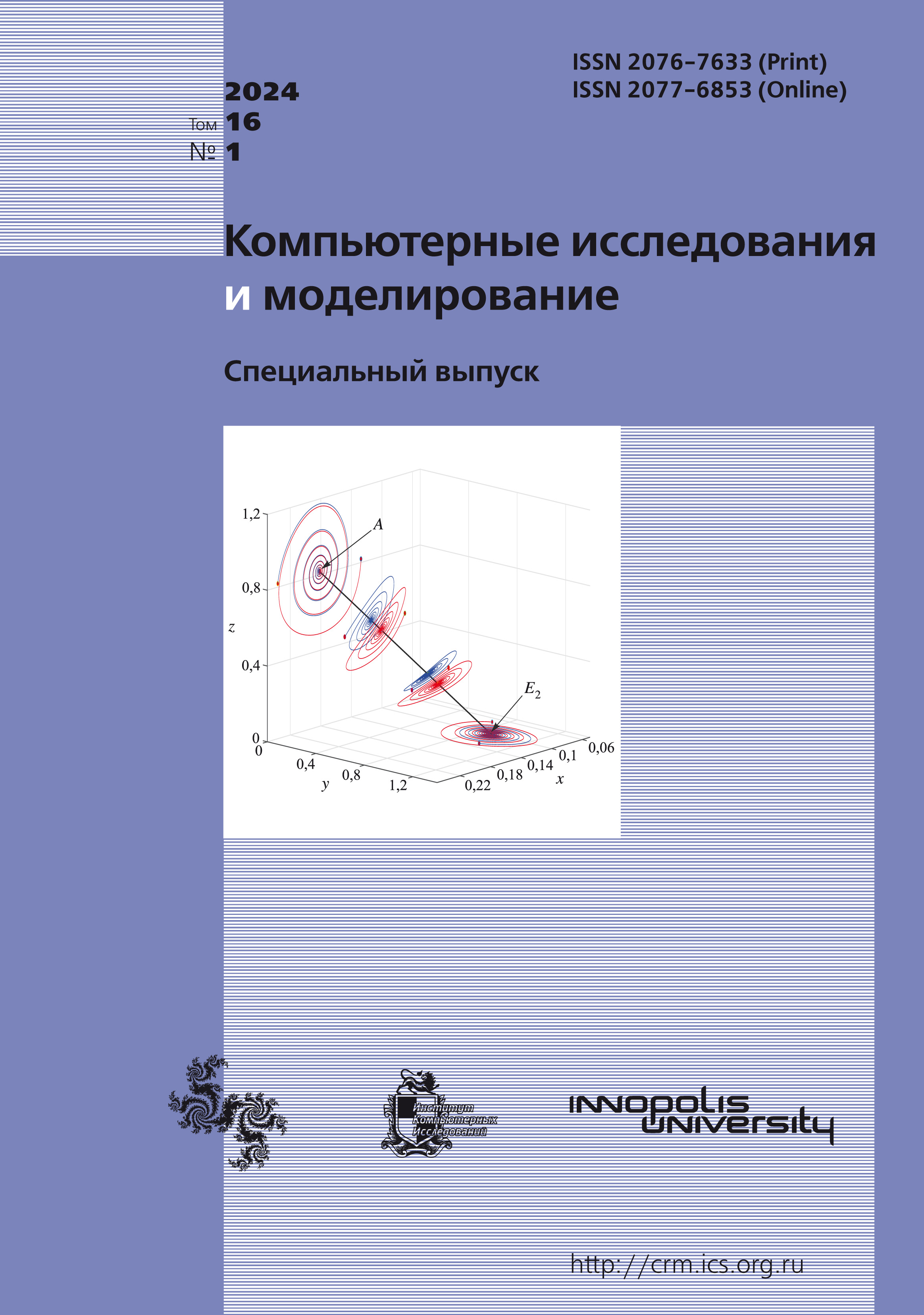All issues
- 2024 Vol. 16
- Issue 1 (special issue)
- 2023 Vol. 15
- 2022 Vol. 14
- 2021 Vol. 13
- 2020 Vol. 12
- 2019 Vol. 11
- 2018 Vol. 10
- 2017 Vol. 9
- 2016 Vol. 8
- 2015 Vol. 7
- 2014 Vol. 6
- 2013 Vol. 5
- 2012 Vol. 4
- 2011 Vol. 3
- 2010 Vol. 2
- 2009 Vol. 1
-
An approach for the nonconvex uniformly concave structured saddle point problem
Computer Research and Modeling, 2022, v. 14, no. 2, pp. 225-237Recently, saddle point problems have received much attention due to their powerful modeling capability for a lot of problems from diverse domains. Applications of these problems occur in many applied areas, such as robust optimization, distributed optimization, game theory, and many applications in machine learning such as empirical risk minimization and generative adversarial networks training. Therefore, many researchers have actively worked on developing numerical methods for solving saddle point problems in many different settings. This paper is devoted to developing a numerical method for solving saddle point problems in the nonconvex uniformly-concave setting. We study a general class of saddle point problems with composite structure and H\"older-continuous higher-order derivatives. To solve the problem under consideration, we propose an approach in which we reduce the problem to a combination of two auxiliary optimization problems separately for each group of variables, the outer minimization problem w.r.t. primal variables, and the inner maximization problem w.r.t the dual variables. For solving the outer minimization problem, we use the Adaptive Gradient Method, which is applicable for nonconvex problems and also works with an inexact oracle that is generated by approximately solving the inner problem. For solving the inner maximization problem, we use the Restarted Unified Acceleration Framework, which is a framework that unifies the high-order acceleration methods for minimizing a convex function that has H\"older-continuous higher-order derivatives. Separate complexity bounds are provided for the number of calls to the first-order oracles for the outer minimization problem and higher-order oracles for the inner maximization problem. Moreover, the complexity of the whole proposed approach is then estimated.
-
A gradient method with inexact oracle for composite nonconvex optimization
Computer Research and Modeling, 2022, v. 14, no. 2, pp. 321-334In this paper, we develop a new first-order method for composite nonconvex minimization problems with simple constraints and inexact oracle. The objective function is given as a sum of «hard», possibly nonconvex part, and «simple» convex part. Informally speaking, oracle inexactness means that, for the «hard» part, at any point we can approximately calculate the value of the function and construct a quadratic function, which approximately bounds this function from above. We give several examples of such inexactness: smooth nonconvex functions with inexact H¨older-continuous gradient, functions given by the auxiliary uniformly concave maximization problem, which can be solved only approximately. For the introduced class of problems, we propose a gradient-type method, which allows one to use a different proximal setup to adapt to the geometry of the feasible set, adaptively chooses controlled oracle error, allows for inexact proximal mapping. We provide a convergence rate for our method in terms of the norm of generalized gradient mapping and show that, in the case of an inexact Hölder-continuous gradient, our method is universal with respect to Hölder parameters of the problem. Finally, in a particular case, we show that the small value of the norm of generalized gradient mapping at a point means that a necessary condition of local minimum approximately holds at that point.
-
Extension of Strongin’s Global Optimization Algorithm to a Function Continuous on a Compact Interval
Computer Research and Modeling, 2019, v. 11, no. 6, pp. 1111-1119The Lipschitz continuous property has been used for a long time to solve the global optimization problem and continues to be used. Here we can mention the work of Piyavskii, Yevtushenko, Strongin, Shubert, Sergeyev, Kvasov and others. Most papers assume a priori knowledge of the Lipschitz constant, but the derivation of this constant is a separate problem. Further still, we must prove that an objective function is really Lipschitz, and it is a complicated problem too. In the case where the Lipschitz continuity is established, Strongin proposed an algorithm for global optimization of a satisfying Lipschitz condition on a compact interval function without any a priori knowledge of the Lipschitz estimate. The algorithm not only finds a global extremum, but it determines the Lipschitz estimate too. It is known that every function that satisfies the Lipchitz condition on a compact convex set is uniformly continuous, but the reverse is not always true. However, there exist models (Arutyunova, Dulliev, Zabotin) whose study requires a minimization of the continuous but definitely not Lipschitz function. One of the algorithms for solving such a problem was proposed by R. J. Vanderbei. In his work he introduced some generalization of the Lipchitz property named $\varepsilon$-Lipchitz and proved that a function defined on a compact convex set is uniformly continuous if and only if it satisfies the $\varepsilon$-Lipchitz condition. The above-mentioned property allowed him to extend Piyavskii’s method. However, Vanderbei assumed that for a given value of $\varepsilon$ it is possible to obtain an associate Lipschitz $\varepsilon$-constant, which is a very difficult problem. Thus, there is a need to construct, for a function continuous on a compact convex domain, a global optimization algorithm which works in some way like Strongin’s algorithm, i.e., without any a priori knowledge of the Lipschitz $\varepsilon$-constant. In this paper we propose an extension of Strongin’s global optimization algorithm to a function continuous on a compact interval using the $\varepsilon$-Lipchitz conception, prove its convergence and solve some numerical examples using the software that implements the developed method.
Indexed in Scopus
Full-text version of the journal is also available on the web site of the scientific electronic library eLIBRARY.RU
The journal is included in the Russian Science Citation Index
The journal is included in the RSCI
International Interdisciplinary Conference "Mathematics. Computing. Education"





